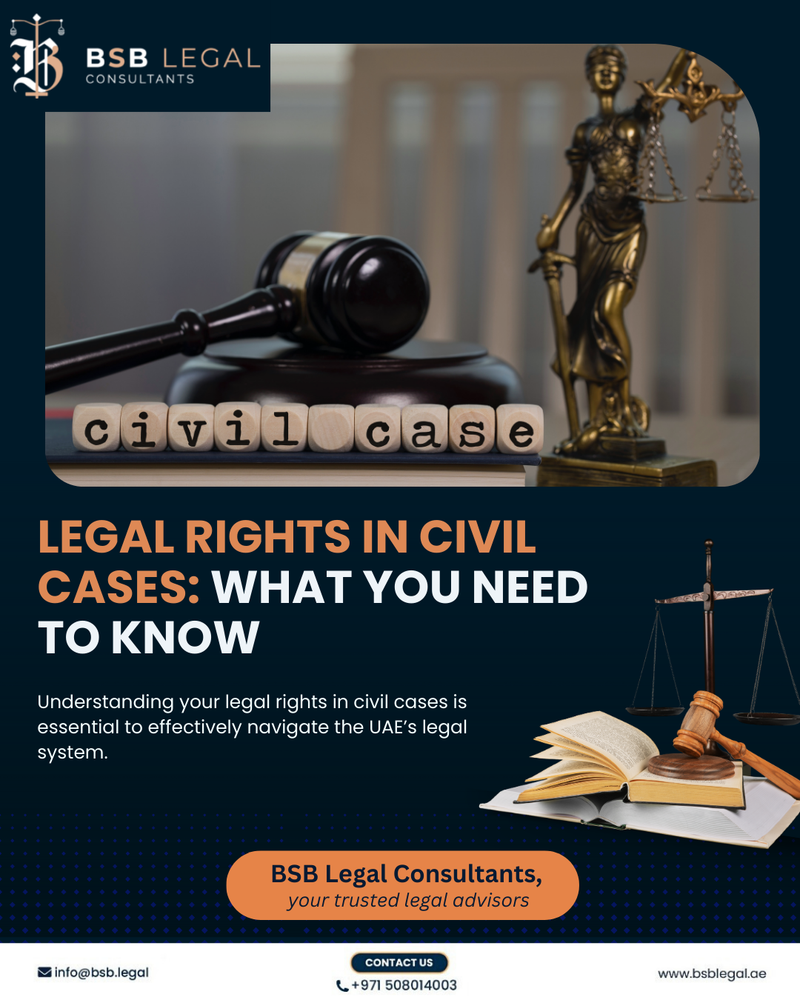Legal Rights in Civil Cases: What You Need to Know

Civil cases cover a wide range of disputes between individuals, businesses, or organizations. These disputes may involve contracts, property, family matters, or personal injury. In the UAE, understanding your legal rights in civil cases is essential for navigating the legal system effectively. Whether you’re pursuing a claim or defending against one, seeking guidance from a legal advisor in Dubai can help you understand the intricacies of civil law and ensure your rights are protected.
Types of Civil Cases in the UAE
Civil law encompasses various types of cases, including:
Contract Disputes: Disagreements over the terms or fulfillment of a contract.
Property Disputes: Conflicts regarding the ownership, sale, or rental of property.
Family Law Cases: Issues related to divorce, child custody, and inheritance.
Personal Injury Cases: Claims for compensation resulting from accidents or negligence.
Consumer Protection Cases: Disputes over faulty products, services, or deceptive practices.
Each type of civil case follows a distinct process, but the core principles of justice and fairness apply across all.
The Legal Process in Civil Cases
Civil cases in the UAE typically follow these steps:
Filing a Claim: The process begins when a claimant files a complaint with the relevant court, detailing the dispute and the desired outcome.
Court Hearing: The court will schedule a hearing, where both parties present their case, evidence, and legal arguments.
Judgment: After reviewing the evidence, the judge will issue a judgment in favor of one party.
Appeals Process: If either party is dissatisfied with the judgment, they have the option to appeal to a higher court.
While the legal process is straightforward, civil cases can often involve complex legal issues, which is why it’s vital to have legal representation.
Your Rights in Civil Cases
In a civil case, it’s important to understand your rights. Some of the key rights include:
Right to a fair hearing: Both parties are entitled to present their case in court and have it heard impartially.
Right to legal representation: You have the right to hire a legal advisor in Dubai to represent your interests in court.
Right to evidence: You have the right to present evidence to support your case. This can include documents, witness testimony, or expert opinions.
Right to appeal: If you believe the judgment is unjust, you have the right to appeal to a higher court.
Having legal counsel ensures that you fully understand these rights and make informed decisions throughout the process.
Common Defenses in Civil Cases
In civil cases, defendants have the right to present a defense to challenge the claimant’s case. Common defenses include:
Lack of evidence: Arguing that the claimant has not provided sufficient proof to support their claims.
Breach of contract: Claiming that the defendant was unable to fulfill the terms of a contract due to unforeseen circumstances.
Consent: Arguing that the plaintiff willingly agreed to the actions or terms in question, such as in personal injury cases.
Statute of limitations: Arguing that the claim was filed after the time limit set by law has expired.
Your legal advisor in Dubai can help you determine the most appropriate defense strategy based on the facts of your case.
The Role of a Legal Advisor in Civil Cases
A legal advisor in Dubai plays a critical role in guiding you through the civil litigation process. Key responsibilities include:
Evaluating the case: Providing an objective assessment of the case’s merits and chances of success.
Advising on strategy: Helping to craft a litigation strategy, whether pursuing a claim or defending one.
Representing you in court: Advocating for your interests during hearings and proceedings.
Negotiating settlements: In some cases, your legal advisor may negotiate a settlement outside of court to resolve the dispute amicably.
Handling appeals: If the case goes to appeal, a legal advisor will help navigate the higher courts and present the case effectively.
Compensation and Damages in Civil Cases
In many civil cases, the claimant seeks compensation for their losses. Compensation can be awarded for:
Financial losses: For example, unpaid debts, property damage, or lost wages.
Emotional distress: In some cases, the claimant may seek compensation for pain, suffering, or emotional harm caused by the defendant’s actions.
Punitive damages: In rare cases, the court may award additional damages to punish the defendant for particularly egregious conduct.
The amount of compensation depends on the nature of the case, the evidence presented, and the judge’s assessment of the facts.
Resolving Civil Disputes Outside of Court
Not all civil disputes need to go to trial. Alternative dispute resolution (ADR) methods like mediation and arbitration offer more efficient and cost-effective ways to resolve conflicts. In mediation, a neutral third party helps facilitate negotiations between the parties, while arbitration involves a third-party arbitrator making a binding decision on the dispute.
Your law office in Dubai can help you explore ADR options and determine the best approach for your situation.
Conclusion
Understanding your legal rights in civil cases is essential to effectively navigate the UAE’s legal system. Whether you’re involved in a contract dispute, property issue, personal injury claim, or any other civil matter, having the right legal representation ensures that your rights are protected and that you have the best chance of achieving a favorable outcome. Consulting with a legal advisor in Dubai is an important first step in resolving any civil dispute.
